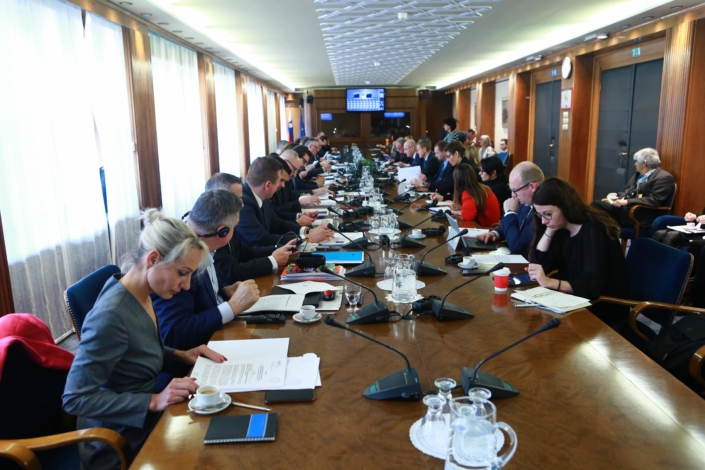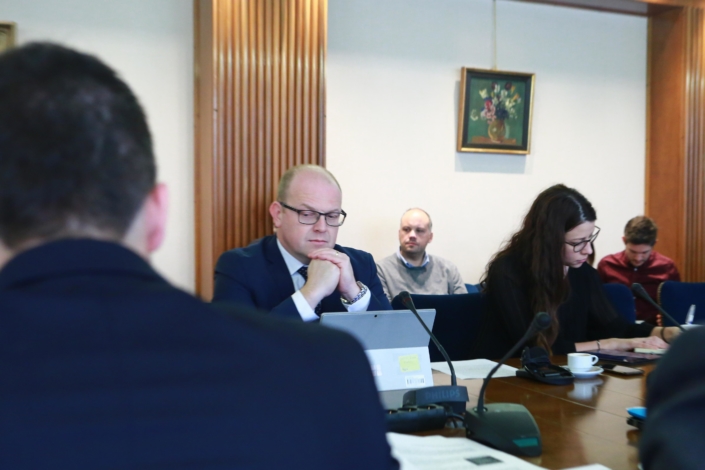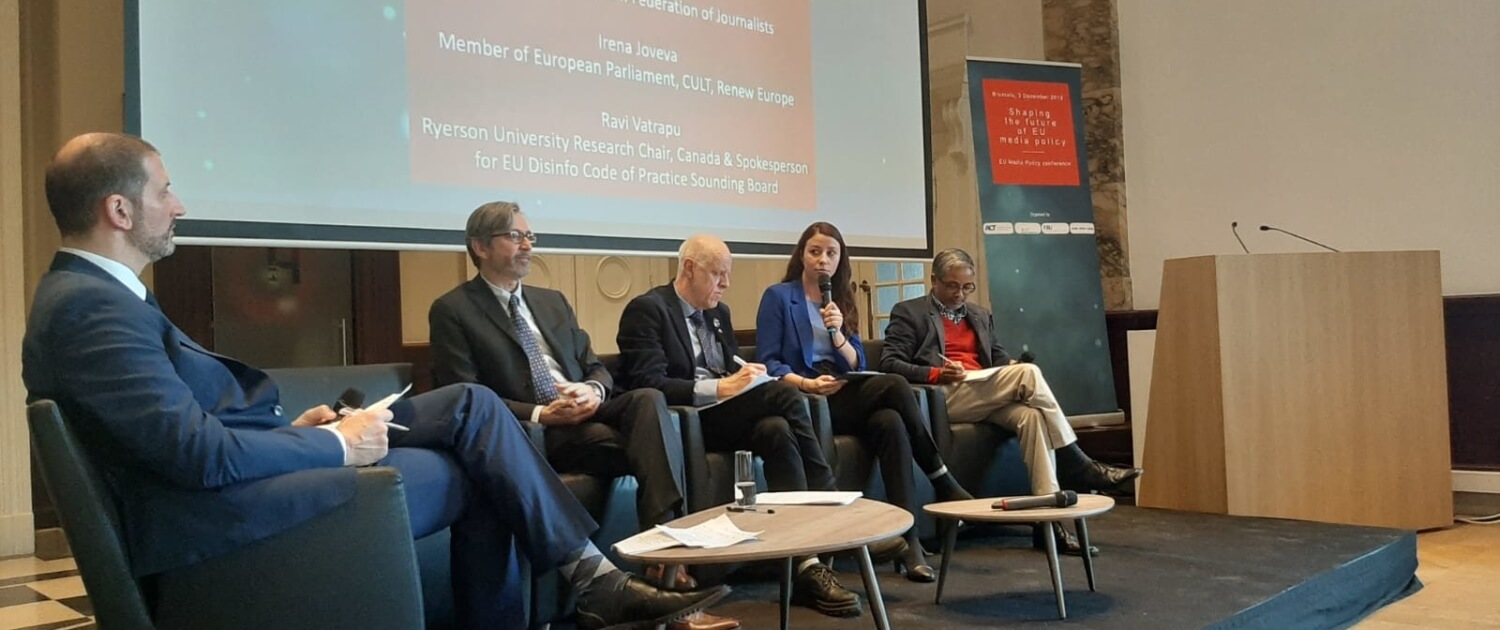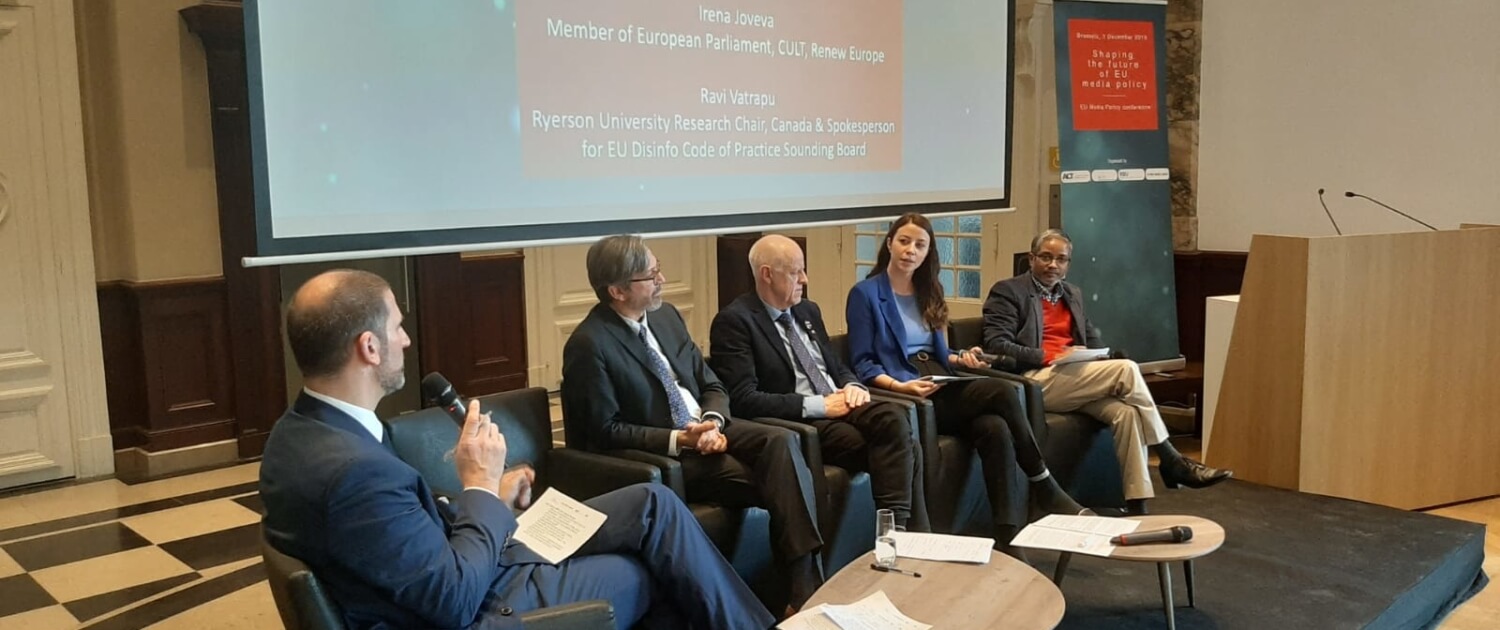On Thursday, 21 November 2019, MEP Irena Joveva gladely responded to a request from a second-grader, Žan Debeljak, from the EGSŠ Radovljica (High school of Economics Radovljica), school she once attended. Students in class 2.g participate as ambassadors of the European Parliament.
Email interview: Irena Joveva and Žan Debelak, 2.g.
1.How do you look at the EGSŠ Radovljica today and what are your memories of your school years?
If you asked me this question after finishing school and going to college in Ljubljana, I would probably – like any typical teenager – answer “finally over”. But over the years, you find that the memories of those times are truly beautiful. Every time I talk with my ex-class mates about our time in high school (yes I am still in contact with many of them), most of us say that we would be glad to go through everything again. Today I view the EGSŠ Radovljica as my ‘kremšnita’ (cream cake), from which I got what I expected and more; from subjects, professors to friends.
2. How did high school shape you?
The years we spend in high school are crucial to our development, although of course we are not aware of it. To be honest: When we had to decide in elementary school where to go next, I had no idea what to choose. I was more interested in social than natural science so I only knew that I wanted to go to high school. Therefore, a high school economics course was the perfect choice for me. High school has molded me into an individual who, in principle, stays on realistic ground but is at the same time a strong altruist. In high school you start to really grow up, slowly becoming independent. I began to appreciate more what I had, from family to friends, and after all, to value myself. The only thing that unfortunately I didn’t manage to transform either in high school or any time later, is that I am always nad still doing everything at the last minute. I guess I work best under pressure.
3. To what extent did this particular high school helped you on the path to the MEP position? What skills have you acquired at our school?
The role I am in right now is a intertwined result of everything. From school to work … Everything I have done so far has been a steping stone the way to here. It is difficult to highlight a single thing or a single life span. Certainly, the EGSŠ Radovljica also contributed significantly. Not only because of all the knowledge I gained there, but also because I doubt that I would have otherwise enrolled in the Faculty of Social Sciences and consequently would probably not be where I am. As far as skills are concerned, I gained a lot of them in high school. I will point out two: 1. writing essays where I learned more structured writing, and 2. learning foreign languages (in my case, these were English and German) already gave me a great deal of knowledge then which later came to my advantage as well.
4. What message do you have for us who are still sitting in school bench?
Be honest, curious and be involved, be active! If you are interested, ask. If you don’t know something, ask. If anything bothers you, speak up. If you agree with someone or someting, say so. Even if you don’t, say so. But say it in a way that does not insult those who do not have the same opinion. Even if someone else is not respectful, do not go down to their level. Be better and keep in mind the following sentence, which is actually my motto: If you behave the way they do, then what is the difference between you two?
No matter where your life takes you stay true to yourself. Know that learning is a lifelong process, so never become ‘omniscient’ or ‘self-sufficient’.
5. What was your first experience as a MEP? What surprised, impressed or perhaps disappointed you?
There was a lot of everything from excitement to (unfortunately) disappointment. When I first came to Brussels as MEP, it had been barely two days since the election, I still had my head full of things. The first thing I thought of when I entered parliament was “how the hell am I going to find anything”. But not in the field of the content, not to be misunderstood, I was concerned about the building itself. A maze, countless offices, corridors, elevators that take you somewhere else on the same floors… The Strasbourg building is even more complex. Well, now, after a few months there, I can already say that I find myself. Together with your team, of course.I was positively surprised that it is much easier at European level to talk to (and negotiate with) colleagues who are not from your political group. On the other hand, it is true that there are many compromises to be made. It’s just part of politics.At the moment, I would rather use the word expectation than any enthusiasm. It is hard to be impressed with everything that is happening in and around the EU, but I ended up running for the changes that I needed. So I expect them to happen, and I will do my best for that. Unfortunately, at the same time, I am aware that not everything is possible for one MEP (no matter which Member State he comes from).And that is precisely where these particular disappointments lie. Most European politicians still live in a bubble of their own and do not understand (or refuse to understand) the real needs and desires of ‘ordinary mortals’, who are not contacted by politics, which is why people themselves are disappointed. Justified.
6. In your opinion, what is the future for the EU and what should you do to further develop the EU in the direction of well-being for all its people?I hope and believe it bright. I believe there is no better alternative than the EU, but we should not take it for granted. Unfortunately, not everyone is aware of these self-explanations – because if legislative processes were not going so slowly, we would still not be dealing with Brexit or the increasingly real big delay in the next financial perspective… And I could list it. Politicians, decision makers are the ones who need to make sure that people feel the EU and feel that we are where we are, for them and for them, not for our own sake.The EU must become a global player in the true sense of the phrase. Where common European policies are necessary and necessary, agreement is necessary and necessary because too much time has already been lost. In particular, I am talking about an agreement on a common foreign, security and migration policy.An important aspect of achieving the policies outlined above, as well as the further development of the EU, is based on the perception of the EU both in terms of politicians and all citizens. Reinforcing the awareness that the EU is a united community within which we live and achieving a mental leap into internalizing European citizenship as our own will play a big role in the future. European citizenship does not mean a rejection of national consciousness or an attempt to unify cultures, but simply an awareness that we are acting for the common good; without overriding the interests of individual Member States.But even more crucial is what I have already mentioned. The EU needs to start responding faster and more specifically to what is happening. All politicians need to get closer to citizens, but to be honest. They have to go out into the field, talk to people so that they understand, not give them the feeling that they are ‘something more’. Once this is achieved, the EU itself will certainly develop towards a better life for all.7. Which of the EU’s strengths do you see as most important?That being said, of course, the EU is not perfect, this is clear, but there is no better alternative. Most important are the foundations on which the EU originated, but many in this community forget it; also on purpose. Peace is this key foundation, a value not taken for granted. Europe has fought too much bloody war – because of the idea that someone is better, more justified, more real. These ideas find their messengers again and again, which in my opinion should be unacceptable.The EU is our wider homeland, where we can move, move, work,… Being able to study abroad and work abroad is one of the most important advantages for me.Mrs Joveva, thank you very much for your comprehensive answers! We wish you much success and satisfaction! Jean Debelak, 2nd yrYou can read more at the EECS Radovljica website.




